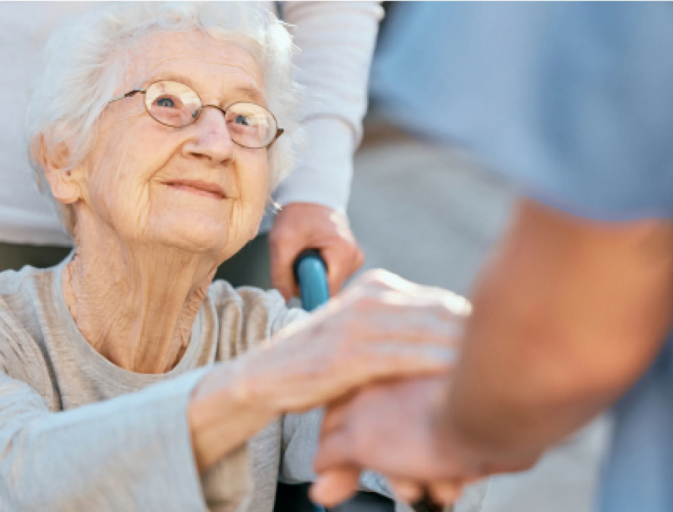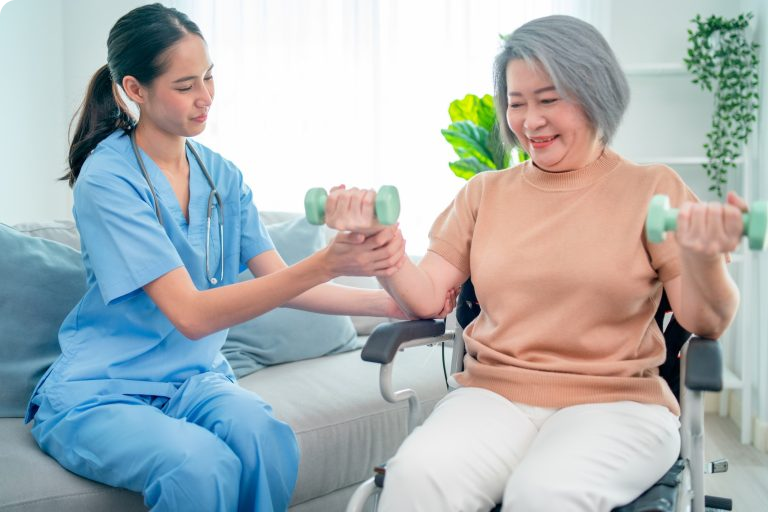Your top choice for compassionateIn-Home Care in Pinellas Park, FL
It's often said that the golden years of your life are the most enjoyable. For most older adults in the U.S., it's a time to unwind, reflect, and live in the comfort of familiar surroundings. And that's how it should be - most senior citizens in America worked hard to build a better economy, serve their communities, and raise their families. Shouldn't they be able to age with grace and dignity at home?
The answer is undoubtedly "yes," but as seniors age, they sometimes need assistance to live independently. Unfortunately, many older adults are unable to rely on adult children for help due to busy schedules, a lack of expertise, or both. That's where Mind & Mobility's home care in Pinellas Park, FL begins to make a lot of sense.
Our in-home care services cater to those who want to stay in their homes as they age but require ongoing care that their loved ones cannot provide. Nowadays, most seniors prefer to live away from long-term care facilities and closer to their home where they feel most at ease.
If you or your senior loved one wants to thrive in their own house and avoid care facilities, in-home care is an effective, safe way to give family and friends the care they need when they need it the most.
 Service Areas
Service Areas

The Mind & Mobility Difference
Mind & Mobility is a home care agency that takes pride in helping seniors enjoy life at home with grace and comfort. One of the biggest reasons why so many seniors and their families choose us is that our senior caregivers in Pinellas Park, FL, do more than just change bedsheets and prepare meals. They make it a point to provide compassionate care and connect with patients on a personal level.
Instead of eliminating independence from our senior population in Florida, we believe in maximizing it - a goal that's not always supported by assisted living facilities and nursing homes. In fact, those locations are often overpriced, understaffed, and known for the spread of disease. Senior care from Mind & Mobility provides a more emotionally and financially relieving option, whether you need a little help around the house or more involved services like companion care or dementia care.
 Read More
Read More
What is Senior Care in Pinellas Park, FL?
Many older adults in the United States prefer to age at home, as it offers a sense of security, comfort, and familiarity. According to an AARP report, three out of four adults aged 50 and above wish to stay in their homes and communities as they age.
However, as adults approach their 60s and 70s, some may require assistance around the house, especially when family members are too busy or live far away. The truth is that the natural process of aging can make it challenging to continue living at home. Simple tasks like running errands become more difficult due to mobility issues. Preparing healthy meals and keeping track of medications and appointments can also become a challenge. Safety becomes a concern, and family members may worry about the well-being of their loved ones.
In these situations, in-home care is often a perfect fit. It allows seniors to enjoy personal independence while also receiving trustworthy assistance from a trained caregiver.
Mind & Mobility provides a comprehensive range of home care services to help seniors stay healthy while they receive the help they need to remain independent. If you have a senior loved one who needs some extra help to stay happy and healthy, giving them the gift of senior care is one of the best ways to show your love, even from afar.
Some of the most common home care services offered at Mind & Mobility include.
- Light Housekeeping
- Nutrition Monitoring
- Assistance with Technology
- Meal Preparation
- Dressing, Bathing, & Grooming
- Medication Reminders
- Laundry Services
- Activity Escorts
- Much More


Did You Know?
U.S. adults over the age of 60 have a 59% higher chance of being unable to perform daily routines and activities if they're lonely.
Our in-home care services are covered by medical insurance, long-term care policies, and private pay. Members have the freedom to choose their own caregiver.
Curious if home care in Pinellas Park, FL is right for you or your older loved one? Contact our office in Florida today for a no-pressure discovery call to learn more. If you or your loved one is ready to live life to the fullest, getting in-home care from Mind & Mobility is a quick, easy three-step process.
1. Speak to a Care Representative
One of our skilled care representatives will speak with you in person or over the phone and help you select the best home care plan to keep your loved one happy at home.

2. Go Over Your Care Plan
A local care professional from Mind & Mobility will travel to your home and sit with you one-on-one to discuss the details of your care plan.

3. Thrive from the Comfort of Home
Once your care plan is selected, you will have the pleasure of watching your senior loved one enjoy an independent life at home with the help of a compassionate caregiver.

Companion Care You Can Count On
Aging in place refers to the practice of aging adults living in their homes as they grow old. Studies show that around 77% of retirees prefer to stay in their homes for as long as possible, and home care can be an excellent way to bridge the gap between receiving elder care and staying at home.
Allowing your aging loved ones to maintain their independence is one of the greatest gifts you can give them. This can contribute to their overall health and well-being, as opposed to a living facility where they may feel powerless and depressed. Unfortunately, these facilities often take away a senior's ability to do simple things like cooking for themselves, scheduling visits with family and friends, and even bathing in the comfort of their own homes.
Home care in Pinellas Park, FL, including companion care services, is designed to provide both medical and non-medical solutions that your senior needs in order to maintain their independence. That way, your senior doesn't have to destabilize their life or adjust to a new way of living away from home.
Mind & Mobility companion care incorporates a number of different services, including.
- Spending Time with Your Senior
- Conversation
- Homemaking Support
- Planning Outings
- Mobility Assistance
- Help with Nutrition
- Staying Active
- Memory Skills and Games
- Running Errands
- More
Getting Started with Companion Care from Mind & Mobility
To learn more about our companion care services, you can contact any of our nine locations in Florida to request a care consultation with one of our representatives. During your consultation, we'll assess your needs to ensure that we provide the right caregiver at the right time to meet your specific requirements.
Doing so helps us ensure that we get it right the first time. We'll also be happy to answer any questions you may have and introduce you to the team of senior home companions who will provide you with companion care services in Florida.
Need home care companion services on short notice? As a respected senior care business with more than a decade of experience, we have access to a large pool of senior caregivers in Pinellas Park, FL who would be happy to provide you or your senior with last-minute support.


Take a Break with RespiteCare Services from Mind & Mobility
Taking care of a senior loved one can be a tiring and overwhelming task, particularly if the caregiver is employed full-time and has other responsibilities to handle. Taking care of an older adult in such a situation can result in caregiver burnout, which can lead to a decline in the quality of care provided and even illness. To combat this issue, many adult caregivers choose respite care as a solution instead of full-time home care in Pinellas Park, FL.
According to AARP, more than 53 million adults in the United States provide care to someone aged 50 or older. Unfortunately, many of these caregivers experience stress, fatigue, and even depression.
Respite care services offer a short-term break to family members and unpaid caregivers from their caregiving duties. This is a crucial service that benefits both seniors and their caregivers and can be arranged for a few hours or even several days, depending on their requirements.
What are the Benefits of Respite Care from Mind & Mobility?
Respite care services can have a significantly positive impact on the health of your elderly loved one, as well as your own. Whether it's for an extended period of time or just a few hours a week, respite care can help ease the burden of caregiving.
Taking some time off for yourself may seem selfish at first, but it's crucial to recharge your batteries to be able to continue providing care. Taking a short (or longer-term) break can also improve the overall quality of your care. Plus, professional respite care services offer your senior an opportunity to learn from and engage with a compassionate caregiver from Mind & Mobility.

Some of the most common caregiving services provided by our respite care professionals include.
- Housekeeping
- Laundry
- Medication Reminders
- Meal Preparation
- Help with Dressing and Grooming
- Bathing Assistance
- More
Our respite care services in Florida are typically offered on a temporary basis. However, we also serve many clients who require assistance on a weekly or monthly basis, depending on their specific needs. We recognize that care needs and schedules can be subject to change, and we strive to be flexible in our approach to ensure that your and your family's needs are met.
 Request Info
Request Info
Three Hurdles That Family Caregivers Face
Caring for your aging parents can be a fulfilling act of love. As you reminisce about the care they gave you while growing up, you now have the opportunity to return the favor. However, providing care for loved ones can be challenging. It's important to anticipate the obstacles you may face and learn how to manage them to protect your own health and well-being.
Here are three of the toughest challenges that family caregivers have to face when caring for their senior parents or loved ones.

Not Enough Support
It's common to feel like you're carrying the majority of the burden when it comes to taking care of your aging parents. However, assuming that you are solely responsible for their care can be overwhelming and cause strain in other relationships. It's important to remember that caring for someone else is not a one-person job. Attempting to do so can lead to burnout, depression, and other serious health issues. It can also negatively impact the level of care your parents receive.

Not Enough Sleep
Interrupted sleep can be a problem for older adults whose circadian clock has shifted, leading them to wake up more frequently throughout the night. It can also be a result of stress and worry. If dementia is a factor, you may need to stay alert due to sundowning and wandering. Those tasks can be difficult and require a sharp mind that has had plenty of rest. In fact, getting enough sleep is crucial for your ability to provide the best care for your parents, as well as for your own physical and emotional well-being.

Not Enough Privacy
Sharing living space with your parents can compromise both your physical and emotional privacy. This is especially true if one or both of your parents have dementia, which can cause them to feel afraid or disoriented when you're not around. At the same time, your parents may also find it difficult to maintain their privacy while under your care.
That begs the question - how can you conquer the challenges that most family caregivers face on a daily basis?
In-Home Care in Pinellas Park, FL Helps Alleviate Your Burden
Mind & Mobility's in-home caregivers can be there to help you ensure the best care for your parents and a healthier life balance for yourself. Taking a break from caregiving is not just a great idea; it's essential.
Our respite care services offer you regular breaks from caregiving, which allows you to take care of yourself while enriching your parents' lives. We provide opportunities for socialization and engaging activities, along with the necessary support to ensure safety and comfort. You can rest easy knowing that your parents are in the best of hands while you take a break.
Reliable In-Home Care for Parkinson’s Disease in Florida
Parkinson’s disease (PD) is a progressive neurodegenerative condition. That means that people who are affected by Parkinson’s have symptoms and difficulties that increase over time, and often in different stages. It’s a disease that affects more than 69,000 individuals in Florida. That number is expected to grow to over 120,000 people by 2030. Given that many older adults are misdiagnosed or underdiagnosed, the number of Parkinson’s patients in Florida is probably even higher.
When caring for individuals with Parkinson’s, it’s important to focus on continually adapting both the home environment and daily routines. As the patient's condition progresses, their health and abilities will change, necessitating adjustments to their care plan. Being proactive in anticipating and accommodating these changes can help to maintain their independence and quality of life for as long as possible.
If your senior loved one has Parkinson’s, there’s no doubt that you’re stressed about how to give mom or dad the best care possible. To solve this challenging problem, many adult children in Florida turn to Mind & Mobility. Our non-medical in-home caregivers work with Parkinson’s patients daily and have the compassion and commitment to care for your senior so you can breathe easier.
Mind & Mobility caregivers are trained and educated to understand the nuances of caring for a person with Parkinson’s. Some of those training highlights include:
- Strategies to Spot and Manage Motor and Non-Motor Parkinson’s Symptoms
- How Parkinson’s Changes and Advances Over Time
- Fall Prevention
- Nutrition and Diet
- Home Safety
- Medication Timing and Reminders
- Light Exercises to Foster Better Balance and Mobility
- Making Adjustments to Maintain Balance and Hand-Eye Coordination
How Mind & Mobility Caregivers Help Loved Ones with Parkinson’s
At Mind & Mobility, we know that your senior needs help to stay independent and healthy in their home. Unfortunately, having to continually adapt to the varying stages of Parkinson’s can be extremely challenging. An in-home care professional who specializes in non-medical Parkinson’s care can help make those gradual transitions easier, by providing compassionate assistance when you need it most.
As Parkinson's is a progressive condition, the care needs of your loved one will evolve as the disease advances. Initially, they may require assistance with daily errands, but this might progress to needing help with personal care and daily activities. At Mind & Mobility, we understand that each individual's care needs are unique, and we work closely with our clients to develop personalized care plans tailored to their specific requirements.
Some of the tasks that our Parkinson’s caregivers focus on include the following:
Once we know the level of care your loved one needs, we'll craft a customized in-home care plan that alleviates your stress and allows your senior to live comfortably at home. Since Parkinson’s changes over time, your in-home care plan may also change, so we can provide the best care possible.
Contact Mind & Mobility today to schedule your initial consultation and learn more about how our caregivers provide compassionate support for patients with Parkinson’s disease.


Compassionate Alzheimer’s Care in Florida
Alzheimer's Disease is a progressive, debilitating condition that affects more than five million people in the U.S. In Florida alone, more than 600,000 individuals are affected. By 2030, that number is expected to increase to five million people. Like many forms of dementia, the impact of Alzheimer’s extends beyond the person diagnosed with it, leaving families in Florida with a crucial question:
“How can we give mom or dad high-quality, dependable Alzheimer’s care?â€
For many adult children, the answer to that question is non-medical in-home Alzheimer’s care from Mind & Mobility. Many seniors in the early or middle stages of Alzheimer’s Disease can receive affordable care at home, especially when compared to the costs of nursing homes or assisted living facilities.
At Mind & Mobility, our specially trained memory caregivers provide dignified care in the comforting environment of home on a recurring basis that fits best with you and your senior loved one’s needs. We understand the significant burdens you bear when a family member is diagnosed with Alzheimer’s.
As such, our compassionate approach to Alzheimer’s in-home care services helps families manage the disease by:
- Maintaining as much independence as possible by allowing your senior to stay in the familiar, comforting environment of home.
- Providing reliable, high-quality Alzheimer’s care services to maintain your parent’s dignity and provide relief to family caregivers.
How Mind & Mobility Caregivers Help Loved Ones with Alzheimer's
Our in-home care services for Alzheimer’s cater to those who want to stay in their homes as they age but require ongoing care that loved ones cannot provide. Nowadays, most seniors prefer to live away from long-term care facilities and closer to home where they feel most at ease. That’s especially true when a senior is experiencing cognitive decline or is in the early stages of Alzheimer’s or dementia.
Our professional, highly-trained caregivers help your senior loved one maintain dignity and quality of life with Alzheimer’s in a number of ways.
- Social Engagement
- Mental Stimulation
- Grooming, Dressing, and Toileting
- Transportation to Doctor Appointments
- Grocery Shopping
- Meal Planning
- Medication Reminders
- Maintaining a Safe Home Environment Free of Hazards
- Keeping a Regular Routine to Minimize Agitation
- Much More
- Arts & Crafts
- Reading
- Viewing Family Photos
- Playing Board Games Like Bingo
- Singing Songs
- Figuring Out Jigsaw Puzzles
- Listening to Music
- Much More
- Going on Walks
- Swimming
- Bed Exercises
- Standing Exercises
- Seated Exercises
- Grocery Shopping
- Light Household Chores
- Gardening
- Dancing
- Much More

Compassionate Care When You Need It the Most
At Mind & Mobility Home Care, we take pride in our commitment to helping older adults maintain a high-quality life. Our team of senior caregivers cares deeply about the well-being of our clients and works together to craft personalized services that are backed by research and experience.
Our home care services are designed to support clients in various ways. Whether it's recovering from hip surgery, preventing falls, enhancing cognitive abilities through brain training, or pursuing new hobbies, you can rest easy knowing we have your senior's health and happiness at heart.
Of course, every one of our clients has their own unique needs and goals, and we adjust their levels of care accordingly. But one aspect of our home care services never changes - and that's the compassionate care we provide to seniors so that they may remain independent.
Contact Mind & Mobility today to take the first step toward aging gracefully at home. We'll be there by your side every step of the way.
THRIVE PROGRAM
When our clients choose to trust Mind & Mobility with their in-home care needs, they are not merely signing up for personal care assistance and supervision so that they are safe and supported as they age. There are many agencies and facilities that can provide that. They are choosing Mind & Mobility to provide safety and support so they can THRIVE in their own home. They are choosing our team of caregivers to support and engage with them so their life continues to be filled with purpose, meaningful relationships, and happiness. Why Mind & Mobility is different is our caregiver’s mindset and programmatic approach. If you take away all decisions and all physical difficulties from the client, that's not CARE-GIVING, that's CARE-TAKING. If you take away all obstacles from someone, you progressively take away their ability to overcome those obstacles. The Mind & Mobility team provides supportive activities, for both the mind and body, that maintains the tools the clients need to continue to lead the purposeful and joyful life they choose.
THRIVE PROGRAM has 3 interconnected components: Mind, Mobility, Engagement

Latest News in Pinellas Park, FL
Emergency Beach Erosion Control Project
Pinellas Countyhttps://pinellas.gov/projects/emergency-beach-erosion-control-project/
Note: Public beach access points within municipal limits are maintained by the municipality. For specific questions about the status of public beach accesses, please contact the relevant municipality.Project OverviewPinellas County is conducting an emergency shoreline restoration project to mitigate critical erosion caused by Hurricane Idalia. The project consists of constructing dunes. The active project area will move strategically along the coast, as County teams have triaged the damage and will work on th...
Note: Public beach access points within municipal limits are maintained by the municipality. For specific questions about the status of public beach accesses, please contact the relevant municipality.
Project Overview
Pinellas County is conducting an emergency shoreline restoration project to mitigate critical erosion caused by Hurricane Idalia. The project consists of constructing dunes. The active project area will move strategically along the coast, as County teams have triaged the damage and will work on the most critical areas first.
This project is separate from the federal beach nourishment project that is currently on hold with U.S. Army Corps of Engineers (USACE).
Sand was trucked in from an authorized location, placed on the beach and shaped into dunes. The new dunes will also be planted with vegetation.
Project Timeline
| Beach Area | Work Start | Work End | Note(s) |
| Belleair Beach | Complete | Complete | Dune planting and maintenance ongoing through Spring 2024. |
| Indian Rocks Beach | Complete | Complete | Dune planting and maintenance ongoing through Spring 2024. |
| Indian Shores | Complete | Complete | Dune planting and maintenance ongoing through Spring 2024. |
| Madeira Beach | Complete | Complete | Dune planting and maintenance ongoing through Spring 2024. |
| Pass-a-Grille (St. Pete Beach) | Complete | Complete | Dune planting and maintenance ongoing through Spring 2024. |
| Sunset Beach (Treasure Island) | Complete | Complete | Dune planting and maintenance ongoing through Spring 2024. |
| Upham Beach (St. Pete Beach) | Complete | Complete | Dune planting and maintenance ongoing through Spring 2024. |
Information for Property Owners
For Pinellas County to place sand and construct dunes, we must obtain short-term construction easements from property owners. These County easements are temporary and different from the perpetual easements required by the USACE project. In lieu of initiating individual projects, property owners are strongly encouraged to allow the County to install erosion control measures that have been permitted and designed to work together.
Project Location
Open the project map in its own tab
Project Funding
This emergency project is supported by the Tourist Development Tax. For more information visit FromVisitorsWithLove.com.
Pinellas Park’s Peculiar Pipe
James Schnurhttps://thegabber.com/pinellas-parks-peculiar-pipe/
Many cities have landmarks that help to define their image. Obvious examples include the Gateway Arch in St. Louis and, closer to home, the Gulfport Casino. St. Petersburg’s downtown piers have also filled this role.Twenty-one years ago, the Florida Department of Transportation (FDOT) installed Pinellas Park’s peculiar pipe that became an unattractive distraction and unexpected landmark.Brown metal tubes started to rise from the ground at a busy intersection in early 2001. Gawkers stared at these cylinders on the so...
Many cities have landmarks that help to define their image. Obvious examples include the Gateway Arch in St. Louis and, closer to home, the Gulfport Casino. St. Petersburg’s downtown piers have also filled this role.
Twenty-one years ago, the Florida Department of Transportation (FDOT) installed Pinellas Park’s peculiar pipe that became an unattractive distraction and unexpected landmark.
Brown metal tubes started to rise from the ground at a busy intersection in early 2001. Gawkers stared at these cylinders on the southeastern and northwestern corners of the intersection of Park Boulevard and 66th Street.
At that time, workers were expanding turn lanes and making other improvements at this location. Some rubberneckers probably assumed that crews had installed a temporary sewer detour during construction. After the traffic cones disappeared, however, the pipes remained positioned in place.
Known in transportation circles as a “monotube,” this structure stands 21 feet above the pavement and stretches 230 feet. Part of a $2-million intersection overhaul, the brown metal fixture cost approximately $200,000 when installed in April 2001.
Finger-pointing began before crews anchored the first traffic light, and not just by those looking at the monotube. When officials in Pinellas Park fielded phone calls, they promptly and properly told irate callers that FDOT bore responsibility. Cities have limited ability to override FDOT’s decisions about design elements on state-owned roadways.
An FDOT spokesperson defended the tube as an economical option that avoided the need to acquire additional right-of-way. Noting that the State required the replacement of the traffic lights at the intersection, FDOT claimed that City leaders had raised no objections to the project during the planning stages.
(Editor’s note: Tom Nicholls, now the City of Gulfport Public Works director, had recently been promoted to the City of Pinellas Park’s Traffic Division Director. He told The Gabber Newspaper no one at FDOT asked for City feedback, as Pinellas County acts as the maintaining authority for all of Pinellas Park’s traffic signals.)
FDOT originally proposed erecting a silver-colored truss. City leaders did not want a truss, and got a tube instead.
Why didn’t traffic engineers simply replace the wiring and install new traffic signals? The answer to that question involves a trip back to August 1992. Hurricane Andrew, a Category 5 storm, cut a devastating path when it hit south Florida.
Nearly all wired traffic signals in impacted areas suffered damage, though those secured to beams did better. In Andrew’s aftermath, state transportation policies called for the mounting of traffic signals at high-traffic destinations onto fixtures built to withstand most hurricane-force winds.
Pinellas Park’s monotube became a possible FDOT prototype for use at busy intersections close to the coast. Designed to survive winds reaching 130 MPH, the monotube securely held signals that would otherwise thrash. Although the first of its type — that held traffic lights — in Tampa Bay, this monotube was not the original one in the Tampa Bay region.
Monotubes made their local debut along portions of the Veterans Expressway and Suncoast Parkway during the 1990s. In March 2001 — a month before the uproar in Pinellas Park — crews erected a green-colored monotube along West Bay Drive.
Largo’s monotube originally went largely unnoticed. Installed as part of a city beautification and FDOT road-widening effort, this structure had no traffic signals. Instead, it supported directional signs for eastbound drivers approaching the Bay Drive intersection at Missouri Avenue/Seminole Boulevard.
Pinellas pundits and casual observers shared their thoughts about the county’s newest landmark. A radio station even solicited names. “Pipey LePew,” a sarcastic spin on the Warner Brothers cartoon skunk character Pepé Le Pew, became a top choice.
This stinky situation left a foul odor in a city that had long sought to improve its image. Pinellas Park traces its origins to a farming colony established after F.A. Davis and other Pennsylvania developers acquired nearly 10,000 acres in 1909.
Incorporated in 1914, the municipality maintained a rural character for decades. During the 1950s, Pinellas Park became an important lower-county crossroads after the westward extension of Park Boulevard into the Seminole area and the eastward relocation of U.S. Highway 19 to its present path from its former route along Alternate 19.
In recent decades, the one-time farm settlement began to grow in new directions. Stretching its boundaries into Lealman and toward Largo and St. Petersburg, Pinellas Park hoped to cultivate a new image and shed the former pastoral punchlines. The brown tube set the wrong tone.
The monotube’s color became a common critique, especially after a DOT representative referred to it as “chestnut bronze.” In early May 2001, the Vitale Brothers talked about possibly tinting the tube blue, and adding images of birds and clouds. He later agreed to paint the pipe for free if FDOT or Pinellas Park provided the paint.
The chorus of criticism resumed in July. When state officials claimed the cost to repaint may exceed $100,000, some condemned these plans as yet another boondoggle. Others suggested a barber pole or candy cane palette instead. Votes from a public forum supported turning the structure blue.
Sandblasting and painting the monotube blue occurred in December 2001, at a cost of approximately $22,000.
As discussions about the color of the Pinellas Park monotube continued in mid-July 2001, Clearwater leaders made decisions about the fate of another controversial landmark. In December 1999, crowds gathered at Clearwater Beach to celebrate the dedication of a new roundabout.
This circle connected Clearwater Memorial Causeway with Coronado Drive, Mandalay Avenue, and Poinsettia Avenue. A $2.1 million fountain at the roundabout’s center allowed water to soar over 40 feet into the air. Smaller fountains surrounded the main one.
The fountain and roundabout became key features in the “One city. One future.” initiative led by Mike Roberto, Clearwater’s city manager at the time. Roberto had no role in designing the fountain. However, he did himself no favors by gushing about its grandeur to a Tampa Tribune reporter.
In a Dec. 22, 1999 Tribune article, Roberto claimed the entryway connecting the Causeway with roads near Pier 60 would improve “one of the most dysfunctional intersections in all of Pinellas County.”
By January 2000, less than a month after the dedication ceremonies, the fountain’s mists and sprays caused confusion and collisions during breezy days. The fountain at what soon became known as the “Roberto Roundabout” lasted less than three years. Demolished in December 2002, fountain remnants ended up as rubble stabilizing the shoreline.
A smaller, drier roundabout at Park Street and Villagrande Avenue South also baffled drivers when it first appeared in 2008. Tubes and traffic circles give some vehicle operators the runaround.
While residents debated pole paint colors, leaders sought ways to prevent the installation of any additional monotubes. In July 2001, they lobbied against a monotube becoming part of intersection improvements at Seminole Boulevard and Park Boulevard.
In August 2001, the Pinellas Planning Council unanimously passed a resolution discouraging FDOT from adding these “obstructive and objectionable” objects to any other local projects.
St. Petersburg leaders passed a separate resolution against monotubes, fearing the state may add them at large intersections. Years later, a skinnier monotube soared above the crossroads of 66th Street and Tyrone Boulevard.
During the busy 2004 hurricane season, storms tested Pinellas Park’s monotube. Tropical storm force winds from Hurricane Frances blew through the area in September 2004. Despite power failures, the stoplights stayed secured to the structure.
Although Pinellas Park’s monotube passed the stress test, it failed in the structural beauty pageant. Since the early 2000s, many traffic lights in the Tampa Bay area have transitioned from hanging wires to mast arm poles. Designed to withstand strong winds, these structures offer a better level of protection for items affixed to them than traditional wires, yet lack the clunky and chubby design of their pipe progenitor.
Tubes, poles, and masts that protect light fixtures pose a challenge for preservationists. Before their installation, house movers could relocate threatened historical landmarks with relative ease. Utility companies temporarily readjusted above-ground wires, crews diverted traffic, and structures moved overnight.
Many of the historical structures located at Heritage Village near Largo and the Pinellas Pioneer Settlement in St. Petersburg arrived in one piece. Transported in part by barge from Clearwater Harbor, the House of Seven Gables reached Heritage Village in one piece after journeying along Walsingham Road in mid-1976.
When Archie B. “Toby” Thomas’s house moving team transported the Snell and Wiliams historic structures to USF St. Petersburg in 1993 and 1995, respectively, Toby stood atop the homes and lifted traffic lights so they could pass through intersections.
Newer traffic devices complicate these logistics. When the Turner Bungalow moved from Clearwater to Heritage Village in January 2014, crews had to remove the roof so the historic home could make the 8-mile journey.
Far into the future, a yet-to-be-born preservationist may advocate moving Pinellas Park’s totally tubular pipe to Heritage Village or another site as a historic landmark.
Wherever it ends up, crews certainly will have to move it in many pieces.
Team Gabber brought back the print version of the newspaper, and we've redesigned our website to make it easier for you to get the news. We're not out of the woods yet, and every little bit helps pay our reporters, printer, and other expenses. Support local news and families — donate now to keep The Gabber Newspaper serving the community it loves!
Please support local news and The Gabber Newspaper!
Pinellas Park works to attract small businesses
Sarah Blazonishttps://www.baynews9.com/fl/tampa/news/2023/07/20/pinellas-park-small-business
PINELLAS PARK, Fla. — Small businesses make up a large part of Florida's economy.According to the U.S. Small Business Administration, workplaces with fewer than 500 employees accounted for more than 99% of businesses in the state last year.They also employed more than 40% of Florida workers.What You Need To Know Pinellas Park's city manager said the city h...
PINELLAS PARK, Fla. — Small businesses make up a large part of Florida's economy.
According to the U.S. Small Business Administration, workplaces with fewer than 500 employees accounted for more than 99% of businesses in the state last year.
They also employed more than 40% of Florida workers.
What You Need To Know
Pinellas Park's city manager said the city has worked hard during the past several years to motivate businesses to set up shop there.
"I would say Pinellas Park is kind of a hidden gem, and we've always been very business-friendly. We cater to small business," said City Manager Bart Diebold.
Diebold said part of that is building a partnership with owners.
"We say, 'Yes.' I mean, that's the thing - when they come in and propose a business, you know, you have zoning rules and building department rules that are out there. We try to say yes to everything we can," said Diebold. "When they come in with a dream, you don't want to just automatically say, 'Hey - your business won't work here. This can't work.' You try to find a way to work."
Justine Welter opened the second location of her business, Just26 Hot Yoga & Meditation, on Belcher Rd. last week.
"Hot yoga is yoga in a heated room, and it can offer a really great detox for you, and it is an awesome physical workout," said Welter.
Just26's original location opened in Largo in 2019. Welter said this time around, she looked at sites near the beach.
"You find that rent is more expensive in those areas, and when I came across this location, it was really nice that it was centrally located," she said.
Welter said she signed her lease at the end of May and was able to open about a month later. She credits the city's efficiency.
"Sometimes, you work with cities that take a really long time to get back to you or, you know, get back to you with certain paperwork that you need, and Pinellas Park was really quick with all of that," she said.
Diebold provided Spectrum Bay News 9 with numbers that show business tax receipts issued by the city increased from just more than 2,400 in 2020 to almost 3,000 this year.
He said revenue from fees rose from $600,000 before 2020 to $800,000 this year, and that's expected to go up again in 2024.
Going forward, Diebold said he'd like to see more housing come to the city. He said it's an important feature to attract businesses of any size.
Pinellas County celebrates ribbon cutting of the ARK Innovation Center Business Incubator
Pinellas Countyhttps://pinellas.gov/news/pinellas-county-celebrates-ribbon-cutting-of-the-ark-innovation-center-business-incubator/
The Pinellas County Commission on Monday, Dec. 18, held a ribbon cutting ceremony celebrating the completion of the ARK Innovation Center, a new 45,000-square-foot business incubator located at 1101 4th St S. in St. Petersburg. The new facility is operated by the Tampa Bay Innovation Center, a tech incubator and accelerator with a well-respected team of board members, advisors, and mentors and a track record of helping tech start-ups grow. After the ceremony, attendees were invited to explore the facility’s collaborative workspaces, of...
The Pinellas County Commission on Monday, Dec. 18, held a ribbon cutting ceremony celebrating the completion of the ARK Innovation Center, a new 45,000-square-foot business incubator located at 1101 4th St S. in St. Petersburg. The new facility is operated by the Tampa Bay Innovation Center, a tech incubator and accelerator with a well-respected team of board members, advisors, and mentors and a track record of helping tech start-ups grow. After the ceremony, attendees were invited to explore the facility’s collaborative workspaces, offices, and event space before tenants settle in over the next few weeks.
“Thanks to the collective leadership and vision of the partners involved in this project, the new ARK Innovation Center business incubator will become a place where start-up founders can connect with mentors to make big ideas come to life, to bring innovation and technology to fruition, and to remove barriers to entrepreneurship,” said Janet C. Long, Chair of the Pinellas County Board of County Commissioners.
Pinellas County in partnership with the U.S. Economic Development Administration, the City of St. Petersburg, the Tampa Bay Innovation Center, and ARK Invest, designed, constructed, and equipped the new facility. The County provided a local match to the U.S. Economic Development Administration’s grant award of approximately $11.3 million for the project design and construction costs supported by the Penny for Pinellas. The City of St. Petersburg donated 2.5 acres of land within its Innovation District to bring the project together. Overall, the incubator’s total cost was approximately $16 million.
The new building is in St. Petersburg’s Innovation District, a collaborative community near the city’s downtown that fosters growth, learning and inspiration with a focus on entrepreneurship, education, technology, life science and other industries. Boasting a strong entrepreneurial culture, the area has drawn support and investment from various corporate and community champions, including Cathie Wood, CEO of ARK Invest, who is a board member of the Tampa Bay Innovation Center and a major supporter.
St. Petersburg Mayor Kenneth T. Welch explained the importance of the new center, “Together we’ve embarked on a journey that will transform our entrepreneurial ecosystem. St. Pete has long been a haven for visionaries, innovators, and creators. The ARK Innovation Center stands as a symbol of our commitment to nurturing and showcasing the incredible talent that is in our community. By focusing on innovation and economic opportunity and developing partnerships with the private sector and our county and federal partners, we are moving St. Pete forward. This is what inclusive progress looks like in the Sunshine City.”
ARK Invest’s collaboration with the new incubator will allow the Tampa Bay Innovation Center to focus on growing early-stage companies that are advancing disruptive technologies in the areas of Internet of Things (IoT), Energy, FinTech, Artificial Intelligence, and Blockchain.
“We will host a variety of tech entrepreneurs, from students to scientists, who are working on innovative projects. Our expertise, programs and opportunities will create a vibrant and enthusiastic atmosphere for the tech startup ecosystem,” stated Tonya Elmore, President & CEO of the Tampa Bay Innovation Center. Elmore added that companies must be building a scalable tech business to take part in the programming and occupy offices onsite.
The ceremonial ribbon cutting was attended by U.S. Representative Kathy Castor (FL-14), the Pinellas County Board of County Commissioners, County Administrator Barry Burton, Pinellas County Economic Development and other County staff. Mayor Kenneth T. Welch of St. Petersburg and the St. Petersburg City Council, city staff, local business leaders from the Tampa Bay region, Cathie Wood and ARK Invest staff also participated in the event.
Remarked Dr. Cynthia Johnson, Director of Pinellas County Economic Development,
“Pinellas County Economic Development supports the communities of Pinellas by advancing our global competitiveness for investment and growth. As we strive to create a more resilient community, we have collaborated with key partners to create a destination for innovation. Collectively, we’ve built an ecosystem for small business and entrepreneurial development, and we believe this facility will be a game changer for excelling in innovation.”
Disclaimer:



 Call Us
Call Us